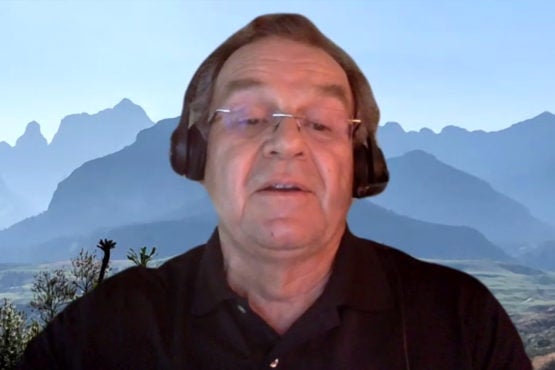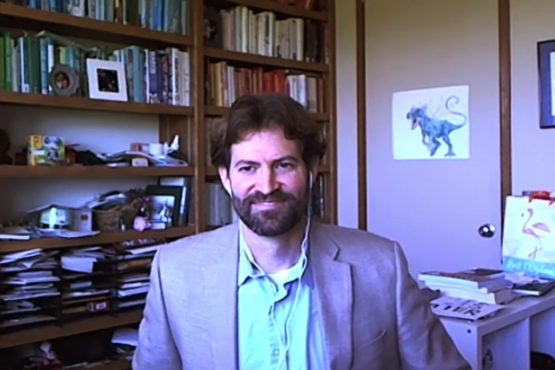Academic Council discusses resolution regarding climate change
At a special meeting on Thursday, the Academic Council discussed but did not vote on a faculty resolution calling on Stanford to greatly accelerate its efforts to divest from fossil fuel companies and to transition to net-zero greenhouse gas emissions no later than 2030.
Stanford has made important progress moving its investments away from fossil fuels, but the urgency of climate change requires the university to do more, Jeffrey Koseff, a professor of civil and environmental engineering, told the Academic Council on Thursday.

In a presentation to the Academic Council, Jeffrey Koseff, a professor of civil and environmental engineering and a senior fellow at the Stanford Woods Institute for the Environment, called on the university to act more aggressively and faster to meet the existential threat of climate change. (Image credit: Andrew Brodhead)
“The Board of Trustees has set us on the path to achieving that strategy, but the urgency of climate changes requires we must do more and we must act more aggressively and faster,” said Koseff, a senior fellow at the Stanford Woods Institute for the Environment.
Speaking at a special meeting of the Academic Council held via Zoom, Koseff said a 21st-century university needs a 21st-century investment strategy to meet the existential threat of climate change.
The Academic Council convened the meeting in response to a petition – signed by more than 100 faculty members – to provide a forum for members of the Academic Council to discuss issues raised at the Faculty Senate meeting on May 28 concerning climate change and divestment from the fossil fuel industry.
The petitioners also sought a faculty resolution calling on Stanford to accelerate its efforts to achieve its stated goals of addressing climate and sustainability challenges.
“The students of this university have stated clearly where they stand,” Koseff said. “The Board of Trustees has clearly laid out its investment intensions and timeline. It is now time for the Academic Council to make its voice heard clearly and unequivocally. We need to move forward purposefully and continue to refocus and redirect our investments as a university, and we need to do it with more urgency.”
Karen Cook, the Ray Lyman Professor of Sociology, presided over the assembly, the second special Academic Council meeting this week. On Tuesday, the Academic Council discussed a petition to amend a new academic policy setting a unit cap on undergraduate majors, but did not vote on the measures because the assembly lacked a quorum.
Presenting the resolution
Koseff, who was one of two faculty members who gave formal presentations at the meeting, said the faculty resolution acknowledges the transformation in the university’s portfolio on energy, and salutes the work of Stanford students whose passion, energy and unrelenting encouragement help move the conversation forward.
“This resolution is about finding common ground among us on the existential threat of climate change, on the social, racial and environmental and resource inequalities and inequities that follows from such change,” he said. “This resolution is firmly about how to meet our responsibilities in solving these challenges.”
The resolution stated that:
- The Academic Council strongly encourages Stanford to urgently continue to refocus its energy sector investment portfolio into non-emitting technologies, as well as to greatly accelerate its present process of divesting from fossil fuel companies.
- The Academic Council strongly encourages Stanford to revise its target date for completing the university’s transition to at least net-zero greenhouse gas emissions in both its operation and endowment to well before 2050, and no later than 2030.
Since the assembly lacked a quorum, the Academic Council did not vote on the resolution.
However, Academic Secretary Tom Wasow said he will ask the Steering Committee to put the resolution on the 2020-21 agenda for the Faculty Senate, and during the Zoom meeting, Political Science Professor Judith Goldstein, the incoming chair, said she would schedule the topic for discussion.

Noah Diffenbaugh, a professor of Earth system science and a senior fellow at the Stanford Woods Institute for the Environment, in his presentation said Stanford will need to reach net-zero in investments and operations well before 2050 to keep the university’s commitment to doing its part to achieve the goals of the 2015 Paris Agreement. (Image credit: Andrew Brodhead)
In a presentation, Noah Diffenbaugh, a professor of Earth system science in the School of Earth, Energy and Environmental Sciences (Stanford Earth), noted that Stanford is committed to doing its part to achieve the goals of the 2015 Paris Agreement, which includes keeping global warming well below 2 degrees Celsius above pre-industrial levels, and pursuing 1.5 C.
“For context, we are already well above 1 degree Celsius and on our way to 1.2,” said Diffenbaugh, a senior fellow at the Stanford Woods Institute for the Environment.
Diffenbaugh noted that the Board of Trustees recently committed to accelerating Stanford’s transition to at least net-zero emissions by 2050. If the world is able to reach net-zero by 2050, there is a good chance planet Earth will avoid 2 C of global warming, he said.
However, given the vast energy poverty in the world today, and the vast need for research on how to reach net-zero at a global scale, Diffenbaugh said the reality is that if institutions like Stanford achieve net-zero by 2050, the world is likely to reach that goal much later.
“In that future, we can be highly confident that global warming will exceed 2 Celsius,” he said. “So, to achieve the goals of the 2015 Paris Agreement, Stanford itself – ourself – will need to reach net-zero in investments and operations well before 2050.”
Talking about the resolution
In the discussion that followed, faculty members talked about a variety of issues, such as the disproportionate impact of climate change on the world’s most vulnerable people.
Others spoke of the need for reinvestment and transitioning to a carbon-free environment. Some faculty members thought the resolution should be stronger. One faculty member noted that the long-term future business plans of oil and gas companies are completely incompatible with the targets of the Paris Agreement. Another faculty member said Stanford has the ability to model the solutions the world needs to follow, and has the intellectual resources, economic resources and “the guts” to do it.
Sally Benson, a professor of energy resources engineering in Stanford Earth, said Stanford has a choice to make: to disengage and divest in the hope a new industry emerges, or engage with the fossil fuel industry to help them change direction and become part of the solution.
Hamdi Tchelepi, also a professor of energy resources engineering in Stanford Earth, said the shared vision of the Department of Energy Resources is to develop the engineering science and educate the future leaders needed to transform the global energy system.
“We are committed to transforming the global energy system and it is counterproductive in my opinion to approach it with divestment, because it’s based on exclusion, as opposed to opening things up to inclusivity and a complete exchange of dialogue and resources,” he said.
Paul Brest, former dean and professor emeritus (active) at Stanford Law School, said he has no doubt that climate change is an existential crisis of the planet and also has no doubt that Stanford can contribute in many ways to mitigating climate change.
“The question for me is whether investment practices are among them,” he said. “Some symbolic actions have real consequence – the removal of the Confederate statues will have real consequences. I’m skeptical about whether divestment does have real consequences.”
Michele Barry, a professor of medicine in primary care and population health at the Stanford School of Medicine, described climate change as the greatest public health challenge of the 21st century.
Gabrielle Hecht, a professor of history in the School of Humanities and Sciences, noted that climate change is a systemic issue with a very long history that is engraved in all energy production systems, in our architecture and in the design of countries and societies.
“It is a difficult problem to overcome and a resolution isn’t going to do that,” she said. “But showing moral leadership is absolutely key. So, in addition to all the various practical things that we can do via our research and via Stanford practices, I think showing moral leadership rather than lagging behind other institutions is absolutely vital.”
Rob Jackson, a professor of Earth system science in Stanford Earth, said the initiative is aggressive and might fail, but asked: “If a faculty at a university with the history and resources of Stanford can’t make a fundamental commitment like this, then who can?”
